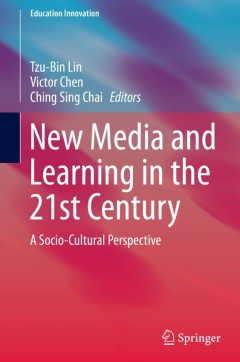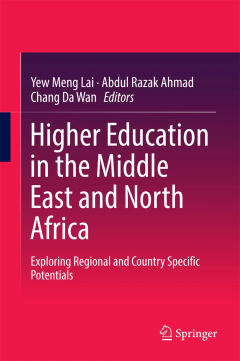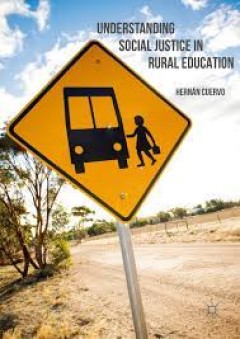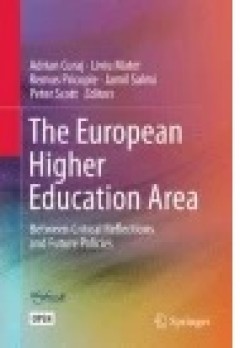Filter by

New Media and Learning in the 21st Century
This volume brings together conceptualizations and empirical studies that explore the socio-cultural dimension of new media and its implications on learning in the 21st century classroom. The authors articulate their vision of new-media-enhanced learning at a global level. The high-level concept is then re-examined for different degrees of contextualization and localization, for example how a s…
- Edition
- 1
- ISBN/ISSN
- 978-981-287-325-5
- Collation
- XII, 216
- Series Title
- Education Innovation Series
- Call Number
- -

Higher Education in the Middle East and North Africa: Exploring Regional and …
This book explores the prospects for higher education development in the Middle East and North African (MENA) region. Adopting a South-South perspective (from the viewpoint of a developing country), it seeks to promote a deeper understanding of this colourful and highly diverse, yet volatile region. As such, it examines six selected MENA countries that serve as case studies for identifying the …
- Edition
- -
- ISBN/ISSN
- 978-981-10-1054-5
- Collation
- XIII, 161
- Series Title
- -
- Call Number
- 379

Reclaiming Composition for Chicano/as and Other Ethnic Minorities: A Critical…
Winner of Honorable Mention for the 2018 Conference on College Composition and Communication Outstanding Book Award This book examines the history of ethnic minorities particularly Chicano/as and Latino/as--in the field of composition and rhetoric; the connections between composition and major US historical movements toward inclusiveness in education; the ways our histories of that inclu…
- Edition
- -
- ISBN/ISSN
- 978-1-137-53673-0
- Collation
- -
- Series Title
- -
- Call Number
- 370.9

Mergers and Alliances in Higher Education
This volume casts light on mergers and alliances in higher education by examining developments of this type in different countries. It combines the direct experiences of those at the heart of such transformations, university leaders and senior officials responsible for higher education policy, with expert analysts of the systems concerned. Higher education in Europe faces a series of major c…
- Edition
- 1
- ISBN/ISSN
- 978-3-319-13134-4
- Collation
- XXI, 307
- Series Title
- -
- Call Number
- -

Fast forwarding Higher Education Institutions for Global Challenges Perspect…
This book addresses various 21st century questions and challenges, especially the role of technology in upgrading teaching and learning in today’s society, and the role of higher education institutions in improving standards of living, economics, society and sustainability. It shares with readers the challenges of globalization to higher institutions concerning the issues relating to value cr…
- Edition
- -
- ISBN/ISSN
- 978-981-287-603-4
- Collation
- XX, 203
- Series Title
- -
- Call Number
- -

University of the World A Case for a World University System
In this book, Dieter Lenzen analyzes the world's three major educational systems: the Continental-European, the Atlantic (Anglo-American) and the East Asian. Distancing himself from the current trend towards the economically driven Anglo-American system of education, the author proposes an alternative model, "a university of the world". Contents: · Three concepts of the universit…
- Edition
- -
- ISBN/ISSN
- 978-3-319-13455-0
- Collation
- V, 52
- Series Title
- -
- Call Number
- -

University Governance in (Post-)Conflict Southern Sudan 2005–2011 The Nexu…
Few studies have looked into the governance of universities in societies affected by armed conflicts, because they are either meant for practitioners or focused on the role of universities for peace and development. Akiiki Babyesiza offers an in-depth analysis of the relationship between state, higher education, and society in a multicultural and multi-religious post-conflict setting and uses e…
- Edition
- -
- ISBN/ISSN
- 978-3-658-08145-4
- Collation
- 2 b/w illustrations
- Series Title
- -
- Call Number
- -

Universities, Rankings and the Dynamics of Global Higher Education Perspecti…
Global university rankings are now more than a decade old and this book uses the data they have produced to examine how the international landscape of universities has changed over the years. It offers new insights into the power and limits of league tables, a key element of globalized higher education that can be deplored but hardly ignored. Case studies from Asia, Europe and North America are…
- Edition
- -
- ISBN/ISSN
- 978-1-137-46999-1
- Collation
- 3 b/w illustrations
- Series Title
- -
- Call Number
- -

Understanding Social Justice in Rural Education
This book explores what social justice looks like for rural schools in Australia. The author challenges the consensus that sees the distribution of resources as the panacea for the myriad challenges faced by rural schools and argues that the solution to inequality and injustice in rural settings has to take into account other important dimensions of social justice such as recognition and associ…
- Edition
- -
- ISBN/ISSN
- 978-1-137-50515-6
- Collation
- VII, 215
- Series Title
- -
- Call Number
- -

The European Higher Education Area
Bridging the gap between higher education research and policy making was always a challenge, but the recent calls for more evidence-based policies have opened a window of unprecedented opportunity for researchers to bring more contributions to shaping the future of the European Higher Education Area (EHEA). Encouraged by the success of the 2011 first edition, Romania and Armenia have organised …
- Edition
- -
- ISBN/ISSN
- 978-3-319-20877-0
- Collation
- XLIV, 898
- Series Title
- -
- Call Number
- -
 Computer Science, Information & General Works
Computer Science, Information & General Works  Philosophy & Psychology
Philosophy & Psychology  Religion
Religion  Social Sciences
Social Sciences  Language
Language  Pure Science
Pure Science  Applied Sciences
Applied Sciences  Art & Recreation
Art & Recreation  Literature
Literature  History & Geography
History & Geography